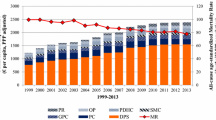Abstract
Objective: The objective of this study was to determine whether there is a measurable health return associated with high pharmaceutical consumption in a sample of developed countries.
Design and setting: The study focused on the production of health, disaggregating healthcare into pharmaceuticals and other healthcare. We controlled for wealth and lifestyle factors. The sample consisted of 21 Organization for Economic Cooperation and Development (OECD) countries and the measure of pharmaceutical consumption used was the best available for a large number of OECD countries. We proxied health with life expectancies at birth, at age 40, and age 60.
Main outcome measures and results: Pharmaceutical consumption had a positive and statistically significant effect on remaining life expectancy at age 40 and 60 years (significant at the 0.10 and 0.05 level, respectively, based on a 2-tailed test), although the effect on life expectancy at birth was small and not significant. Sensitivity analysis showed that these results were generally robust. A significant effect of pharmaceutical consumption on infant mortality was not demonstrated and results of the infant mortality model were very sensitive to small changes.
Conclusion: Increased pharmaceutical consumption helps improve mortality outcomes, especially for those at middle age and older.






Similar content being viewed by others
References
Frech III HE, Miller Jr RD. The productivity of health care and pharmaceuticals: an international comparison. Washington DC: American Enterprise Institute Press, 1999
Stewart Jr CT. Allocations of resources to health. J Hum Resour 1971; 6 (1): 103-22
Auster R, Irving L, Sarachek D. The production of health, an exploratory study. J Hum Resour 1969; 4 (4): 411-36
Lena HF, London B. The political and economic determinants of health outcomes: a cross-national analysis. Int J Health Serv 1993; 23 (3): 585-602
Wnuk-Lipinski E, Illsley R. International comparative analysis: main findings and conclusions. Soc Sci Med 1990; 31 (8): 879-89
Hadley J. Medicare spending and mortality rates of the elderly. Inquiry 1988; 25 (4): 485-93
Hadley J. More medical care, better health? An economic analysis of mortality rates. Washington DC: The Urban Institute Press, 1982: 235pp
Zweifel P, Ferrari M. Is there a Sisyphus syndrome in healthcare? In: Zweifel P, Frech III HE, editors. Health economics worldwide. Amsterdam: Kluwer Academic Publishers, 1992: 311-30
Babazono A, Hillman AL. Acomparison of international health outcomes and healthcare spending. Int J Technol Assess Healthcare 1994; 10 (3): 376-81
Peltzman S. Regulation and health: the case of mandatory prescriptions and an extension. Managerial Decis Econ 1987 Mar ; 8 (1): 41-6
Lichtenberg FR. The effect of pharmaceutical utilisation and innovation on hospitalization and mortality. NBER Working Paper, Jan 1996. Paper no.: 5418
Cutler D, McClellan M, Newhouse J. The costs and benefits of intensive treatment for cardiovascular disease. Unpublished paper presented at AEI/Brookings Conference on Measuring the Prices of Medical Treatments. Dec 12 1997
Soumerai SB, Ross-Degnan D, Avorn J, et al. Effects of Medicaid drug-payment limits on admission to hospitals and nursing homes. N Engl J Med 1991; 325 (15): 1072-7
Soumerai SB, McLaughlin TJ, Ross-Degnan D, et al. Effects of limiting Medicaid drug-reimbursement benefits on the use of psychotropic agents and acute mental health services by patients with schizophrenia. N Engl J Med 1994; 331 (10): 650-5
Szuba TJ. International comparison of drug consumption: impact of prices. Soc Sci Med 1986; 22 (10): 1019-25
Danzon PM. Pharmaceutical price regulation: national policies versus global interests.Washington DC: American Enterprise Institute Press, 1997: 107pp
Danzon PM, Percy A. The effects of price regulation on productivity in pharmaceuticals. Unpublished paper, The Wharton School, University of Pennsylvania. Jul 1995
Gaziano JM, Buring JE, Breslow JL, et al. Moderate alcohol intake, increased levels of high-density lipoprotein and its subfractions, and decreased risk of myocardial infarction. N Engl J Med 1993; 329 (25): 1829-34
Acknowledgements
This study was conducted under a grant from the Chair of Economics and Management of Health, Institute d’Etudes Politiques (Sciences Po) de Paris.
Author information
Authors and Affiliations
Additional information
These results are reported in greater detail in H.E. Frech III and Richard D. Miller.
Rights and permissions
About this article
Cite this article
Miller, R.D., Frech, H.E. Is There a Link Between Pharmaceutical Consumption and Improved Health in OECD Countries?. Pharmacoeconomics 18 (Suppl 1), 33–45 (2000). https://doi.org/10.2165/00019053-200018001-00006
Published:
Issue Date:
DOI: https://doi.org/10.2165/00019053-200018001-00006




